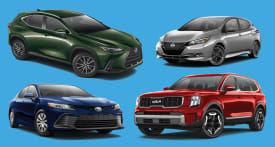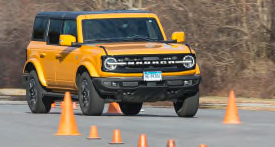New Cars You Can Count On: Highlights From Consumer Reports' Latest Car Reliability Survey
CR's latest survey reveals some important findings on hybrids and EVs, and will guide you to the most reliable sedans, SUVs, and trucks

Shopping for a new car tends to be an anxiety-ridden process. It’s one of the largest single purchases many people make, and no one wants to waste money—or time—on a model that will be a regular at the repair shop.
Sedans Are Still Most Reliable
Each year consumers abandon sedans in greater numbers for the size and utility offered by SUVs and pickups. But sedans remain the most reliable type of vehicle in our survey.
Overall, their average predicted reliability score is 58 (on a scale of 0 to 100), followed by SUVs at 51. Minivans come in with an average rating of 44, with pickups trailing at 39.
Why are sedans so much more reliable? Much of their advantage comes from being older models, so automakers have had time to work out the bugs. They also lack problem-prone features like rear-seat entertainment systems and the power sliding doors on minivans.
Hybrids Have Few Problems
We received more data on hybrids in this year’s survey than in past years. It revealed that most hybrids have reliability that is as good as or better than their non-hybrid counterparts.
Some owners of the regular 2022 Ford Escape SUV reported braking problems, but we received zero reports of these issues from owners of the hybrid version. Similarly, owners of the non-hybrid 2021 Escape reported that the eight-speed automatic transmission had rough shifts and would slip (not stay in gear), while Escape Hybrid owners reported no problems with its continuously variable transmission.
Hybrids’ appeal extends beyond reliability. “They’re more fuel-efficient, and can be less expensive, than their non-hybrid cousins,” says Jake Fisher, CR’s senior director of auto testing.
Problematic Plug-Ins
Now that more (as well as less-expensive) EV models are being introduced and selling in greater numbers, more respondents are reporting problems with EV-specific systems, including the battery packs, charging systems, and drive motors.
These problems are seen across multiple EVs, including the Chevrolet Bolt, Ford Mustang Mach-E, Hyundai Kona Electric, and Volkswagen ID.4, which all have below-average reliability.
“In previous years, EVs have had high rates of problems with infotainment system display screens and other in-car electronics, just as many conventional models do,” Fisher says. “This year, issues with those systems remain, while problems specifically with EV-related components are now being reported.”
Plug-in hybrids had similar issues. Both the Toyota Prius Prime and RAV4 Prime have lower reliability scores than their hybrid and, in the case of the RAV4, conventional siblings. And the plug-in Chrysler Pacifica Hybrid is one of the least reliable vehicles in the survey.
Pickup Troubles Continue
Pickups have been at the lower end of our reliability ratings for six of the past seven years. Only seven of the 17 models in the survey have average or better reliability.
The Toyota Tundra, redesigned in 2022, had below-average reliability in its first year. Similarly, the new-for-2022 Hyundai Santa Cruz small pickup, the midsized Nissan Frontier and Jeep Gladiator, and the full-sized trucks from Ford and General Motors all earned below-average reliability scores.
There are bright spots: The Toyota Tacoma scored above average, as did the new Ford Maverick and Maverick Hybrid. If you want a pickup truck with a proven record of reliability, stick with the Ford Ranger, Honda Ridgeline, or Tacoma.
Who’s Up and Who’s Down?
Even a once-reliable model can develop problems, particularly after an automaker introduces a new engine or updates the infotainment system. An automaker can also make fixes to an unreliable model so that later versions become trouble-free. This list highlights the newly recommended models and those that lost CR’s coveted check mark. For more details and comments from manufacturers that lost recommendations, go to CR.org/reliability.
Newly Recommended: Models With Improved Reliability
- Audi Q3
- Buick Enclave
- Chevrolet Corvette
- Ford Escape Hybrid
- Genesis G80, GV70
- Hyundai Santa Fe, Santa Fe Hybrid
- Kia Seltos, Sorento Hybrid, Soul
- Lincoln Corsair, Nautilus
- Mini Cooper
- Mitsubishi Outlander
- Nissan Rogue
- Subaru Ascent
- Toyota Corolla Hatchback
- Volvo S60
No Longer Recommended: Models With Declining Reliability
Editor’s Note: This article also appeared in the January 2023 issue of Consumer Reports magazine.
















